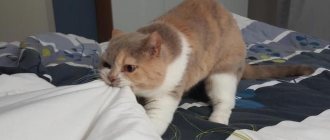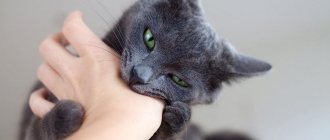With the appearance of a cat in the house, the owners immediately have a lot of pleasant and not so pleasant troubles. Many owners complain that their pets are excessively talkative, which is impossible to cope with. In fact, no pet will scream, meow, or otherwise vocalize constantly. Finding the reason and weaning the cat from yelling becomes the primary task for the owner.
Variety of sounds in cats
With the help of sound signals, animals express their feelings and sensations, communicate with fellow tribesmen and exchange information. The cat's “language” includes a wide and varied audio set, each element of which has its own intonation and emotional coloring.
The domestic mouse can reproduce:
- vibrating purring;
- gentle meow;
- aggressive hissing;
- angry growl;
- long, loud shout
The last sound impact is also described as a “howling scream” and “heart-rending scream”, and its strength and duration often reaches the limit of human patience.
Main reasons. Animal psychologists name 3 reasons for cat loudness:
- instincts and physiological needs;
- boredom and loneliness;
- malaise and pain.
By carefully looking at your pet and identifying provoking factors, you can deal with the problem.
Cases requiring contact with a veterinarian
If a cat constantly meows and itches, then he may have fleas, lice eaters, or other ectoparasites (living outside). Allergies and ear mites may also have such manifestations. It is necessary to show your pet to a doctor to determine the cause of this behavior and determine measures to help.
A hard, inflated belly speaks together with a loud meow, serious anxiety or, conversely, lethargy; increased appetite or its absence indicates a helminthic infestation.
In such cases, you should consult your veterinarian. He will prescribe an anthelmintic and tell you how long to give it.
If the kitten cries loudly and trembles at the same time, you can try to warm it or feed it. If the cause is not hunger and cold, then you need to see a doctor, as this may be damage to the spine.
Refusal to eat, diarrhea, or, conversely, cleanliness in the tray for a long time, accompanied by plaintive and constant meowing, is also a reason to seek medical help.
A caring owner always understands his pet. Cats have almost no means of expressing their complaints or wishes other than by making sound signals. It is important to understand what the pet wants to communicate and provide him with all possible assistance.
The main reasons why cats get restless at night, why do they scream?
If we are talking about uncastrated cats and unsterilized cats, then at such moments their natural desire to reproduce prevails. Therefore, with such cries, representatives of the cat family invite potential soul mates, informing them of their readiness to reproduce.
It may happen that the animal screams because of illness or some kind of ailment that causes him suffering. For older cats, this could be a nervous disorder or Alzheimer's syndrome. Abdominal pain can plague animals of any age. And this can be understood by feeling the pet’s belly - its hardness will clearly indicate that this is the cause of concern. In a cat that has always been calm and suddenly begins to exhibit similar behavior, the cause may be common worms.
Urolithiasis bothers older animals, manifesting itself most strongly after it relieves itself. A clear confirmation of this is the cat's anxiety and screams after he leaves the tray. Neutered cats who have had part of their ovary retained may also experience anxiety and screaming.
Kittens suffering from lack of attention and trying to demand a treat or game from their owner also scream. Moreover, having received what they want, they very quickly remember the method by which they can achieve what they want and use it again and again. In addition, a kitten that has been weaned from its mother and just brought into a new home can behave very restlessly. He may refuse to eat, walk everywhere and scream, calling for his mother. If a kitten screams at night, then over time he will get used to it, adapt and stop such screams.
Also, a cat's screams can mean anxiety. It’s not for nothing that cats’ so-called sixth sense is so acute that since ancient times people have used them to predict various natural disasters, such as earthquakes. The pet's anxiety in this case may have the purpose of warning the owner about something. But such behavior, of course, is not observed every day, but only occasionally.
The possessive nature of cats forces them to mark their territory to prevent other animals from claiming it. But in order to reinforce the marks with more eloquent actions, cats declare their rights with such loud cries.
The reason for screaming is instincts and physiological needs
Living next to humans, domestic cats nevertheless have not lost touch with pristine nature and build their behavior, guided by genetically inherent aspirations. Such an internal “navigator” can completely subjugate and significantly change the usual nature.
Instinct for procreation
The most trivial reason for cat concerts is sexual desire.
Behavior of females. The “basic instinct” is so dominant and strong that zoologists call the time of female sexual activity “estrus,” which means “passion” and “fury.” Representatives of felines not only clearly demonstrate their readiness to mate, but also actively search for a male and literally seduce him. In a house where an unsterilized cat lives, days of estrus are marked by a loss of peace for the whole family, given that in the daily schedule the peak of cat activity occurs in the evening and night.
The inviting cries of the “bride” are accompanied by the following accompanying signs:
- ignoring food;
- frequent visits to the toilet;
- thorough licking of the intimate area;
- visual pose on half-bent legs with arched back and raised tail;
- turning over on your back and rolling on the floor.
Behavior of males. Male cats scream even louder and more intensely, and metaphors in the style of “March serenades” or “demonic screams” are attributed to their concerts. In addition, uncastrated males have a habit of leaving strong-smelling marks anywhere and everywhere, and this tendency only intensifies during the period of cat weddings.
What is the danger? The call of nature is so strong that the mustachioed striped creatures, who have never left the confines of a human home, can suddenly go in search of “their soulmate,” which is fraught with misadventures in the style of:
- falling out of a window;
- death under the wheels of a car;
- injuries in fights with relatives;
- inability to find the way home.
If the gulena does return to the company, then he will most likely bring dubious “gifts” in the form of infections, parasites or unwanted offspring.
What should the owner do? Drops and tablets with hormonal drugs sold in pet stores will help to freeze the sexual activity of cats and stop the unbearable screams. However, abuse of these drugs can lead to undesirable changes in the body, in particular the development of genital tumors. Therefore, the most radical method is the complete sterilization of animals that do not represent breeding value and do not participate in breeding.
Eating behavior
The nuances of food activity are also associated with sound manifestations. There are 3 situations when cat screams are provoked by food:
- pets quickly get used to the daily routine and demand dinner if it is delayed a little;
- a cat spoiled by food refuses the usual food in its bowl, but persistently begs for a treat;
- a well-fed cat does not want to leave the kitchen when food is being prepared for people or the whole family is gathered at the table.
Owner actions. To wean a cat from demanding food, you should adhere to the rules linking the hierarchical rank of the animal with eating behavior:
- exclude the presence of the animal in the kitchen until its bowl is full and takes its usual place;
- after 30 minutes, the remaining food must be removed and the pet must be removed from the kitchen;
- throwing, screaming and scratching outside the door should be coldly ignored;
- in case of refusal of food, the usual portion should not be immediately replaced with a treat - the cat probably decided to give himself a fasting day;
- During a family meal, a pet should not be present in the kitchen, much less behave like a beggar.
This is how, in cat language, imitating relationships in a pride of lions, the status quo is restored, and the cat, as the weakest and lowest member of the community, ultimately resigns itself to the orders established by the leader. If the cat is constantly hungry, then the owner is required to review the diet and feeding standards.
Increased activity at night
Cats are nocturnal predators, so they spend almost the entire daylight hours in a sweet slumber. But as soon as dusk falls, the pet wakes up and is ready to go hunting. Seething energy makes a well-rested and well-fed cat run around the rooms, play mischief, sharpen its claws, play with toys and demand increased attention from sleeping people. Young animals are especially energetic.
The owners, naturally, are not delighted with such a cat routine and try to reason with the pet by force. However, such behavior is just a consequence of a lack of movement and muscle activity.
Daytime physical inactivity.
If a cat wakes up during the day only to eat, lick itself and go to the toilet, then physical inactivity can be diagnosed.
To maintain health, obeying instinct, such a pet is forced to warm up at night, while animals that receive proper physical activity during the day are not active for long in the evenings and sleep peacefully at night.
What to do. You can re-educate a nocturnal predator by changing its daily activity schedule. To do this, you should use the appropriate techniques:
- outdoor games with balls, feather teasers, wind-up mice and laser pointers;
- installation of cat sports complexes, including scratching posts, hammocks, houses and playgrounds at different heights;
- harness training and street walking on a leash;
- practicing commands and circus tricks, in particular the ability to carry small objects in the teeth or walk on the front paws.
What to do if your cat meows?
If your cat meows, find out what is bothering her. Depending on the situation, the problem can be solved with attention, education or treatment.
Find out the reason
First, make sure that your pet is not in danger. If he looks healthy, check the relevance of the physiological desires listed above. Very often the problem is solved by feeding, changing water or filler. When sexually hunting, you can simply wait or resort to castration, since taking hormonal drugs provides only a temporary solution to the problem and often leads to complications.
Give enough time, talk, caress
If the animal does not have enough attention, try to allocate more time for stroking and talking. Regardless of the situation, you need to communicate with your pet daily. Regularity is much more important than duration, but ideally both conditions should be met.
Treat your pet with special warmth when he is nervous or afraid. Your affection will give him a feeling of security, but it is better to avoid pity. Behave as usual so that the cat is convinced that there is no real threat from the irritating factor.
Parenting moments
Behavior correction is necessary for hyperactive animals and manipulative pets. If your cat lacks attention due to excess energy, buy him interactive toys and play with him more often before going to bed.
Manipulators will have to be dealt with using classic methods: ignoring or punishment. The same goes for those who are too talkative. If your cat's talkativeness tires you, make comments to him. To do this, use a strict intonation, but avoid shouting.
Remember that this method is effective only in certain situations (bedtime, your illness, severe stress after work). Too frequent tugging or ignoring can offend the mustachioed person and have a negative impact on his psyche.
When to visit a veterinarian
You should contact a veterinarian in 2 cases: if you have any alarming symptoms and if there is prolonged meowing that has no justification. Some pathologies, including psychological diseases, occur unnoticed in the early stages of their development. Because of this, a complete examination of the animal is required to make a diagnosis.
You may also need help from a veterinarian to suppress sexual desire and relieve stress. In the first case, you will have to resort to surgical intervention, and in the second, to taking sedatives.
Diseases and conditions requiring medical attention
A kitten may cry and meow loudly because something hurts. The cause of pain may be poor digestion or a serious illness. It is necessary to carefully examine the pet and observe its behavior.
The following symptoms should alert the owner:
- increased body temperature, dry nose (in cats the normal temperature is about 38 degrees, in a kitten this figure can vary significantly, since the process of thermoregulation has not yet been established);
- prolonged cleanliness in the tray or, conversely, diarrhea;
- blood in the urine or stool;
- vomit;
- loss of appetite or complete refusal to eat;
- discharge of various types from the eyes, ears;
- swollen, hard tummy;
- impaired coordination of movements.
You should also observe how often the kitten itches. If he constantly bites himself, gnaws something in his fur, or scratches himself heavily, this is a sign of infection with ectoparasites. If these symptoms appear, you should immediately show the animal to a veterinarian. He will determine the cause and prescribe the necessary treatment.
Hunger
A kitten may give a vocal signal for a completely natural reason: it is hungry. This is the most common reason why animals meow. This applies to both children and adult pets. First of all, any living organism tries to satisfy its nutritional needs. And the kitten, once in a new place, first learns where the “food source” is located. Not finding food, the small animal begins to worry, and then declares its needs to the person.
It is advisable that there is always some food in the bowl; this will save the owner from constant plaintive cries.
In some cases, the cause of meowing is pseudo-hunger. That is, the kitten is full, but with the help of its voice it tries to beg for tidbits. Usually this characterizes the pet in a certain way: he wants to dictate conditions, tries to beg for something tasty, and thereby force the person to follow his lead. As with children, you need to be firm. You cannot indulge your pet's first desire. This does not mean that an animal should not be pampered at all, but in childhood this is especially fraught with consequences. If a person does not want to constantly endure impudent extortion from the cat, then he should make it clear from the very first attempt who is boss in the house. The pet must understand that nothing will be given to him upon request, and the decision as to whether he will receive a treat or not will be made solely by the “senior”.
The reason for screaming is boredom and loneliness
A pet, accustomed to sleeping in bed next to its adored owner, will experience great disappointment when it finds itself outside its cozy “den.” If the owner decides to accustom the kitten to a personal bed, then this should be done very gradually, first by installing a house, hammock or basket in the bedroom. The process of luring a cat to the bed also contains several secrets, including the use of:
- treats that guarantee long-lasting chewing pleasure (for example, chewing sticks, a piece of meat with cartilage, or a whole sea fish);
- favorite toys;
- catnip.
And only after time has passed, when the pet has learned to sleep alone, the bed can be taken outside the bedroom.
Loneliness. The most striking manifestation of irrepressible screams of a psychological nature is the period when a lonely pet remains locked in an apartment. This happens when the owner:
- goes to work;
- goes on a business trip;
- ends up in the hospital;
- is delayed in absence for one reason or another.
Separation is especially difficult for small kittens that need constant attention, and affectionate, affectionate animals with a strong emotional connection with the owner.
What to do. To alleviate stress, felinologists recommend purchasing effective entertainment for the mustachioed-striped cat with which he could entertain himself while his owner is away, namely:
- bouncing balls, auto-winding mice, interactive toys;
- chewing sticks;
- automatic feeders that release several tidbits after a certain period of time;
- cat play complexes;
- indoor aquarium with live fish or its imitation.
Adviсe
The main thing is to try to make sure that the cat spends as much energy as possible in a day. Even if she waited all day for her owner to get home from work, bored at home. Usually in such cases the pet sleeps all day, and when the person returns, the animal begins to frolic. This means that while no one is at home, the cat should be provided with activity in the form of various toys, scratching posts, stairs and houses that it can climb.
It’s also a good idea to use videos from the Internet made specifically for animals - a fly or mouse moves across the screen in them, and the cat enthusiastically catches them.
It is advisable to set up a place for your pet on the windowsill so that he can observe everything that is happening on the street. Well, pay attention to it in the morning and evening - talk to the cat, whenever possible, allow it to participate in household chores, do not forget about caring for the pet. In general, demonstrate an emotional connection with him in every possible way so as not to wonder why the cat meows at night.
You shouldn’t lock your cat in the bathroom or kitchen at night if she could freely walk around these rooms during the day. It will logically strive to regain control over the territory that has become inaccessible.
When nothing helps, and medical causes are excluded, it is better to consult a zoopsychologist. He will determine whether the cat's behavior is the result of severe stress, illness, excess or lack of nutrition.
The border is under control
We know well that a cat is a territorial animal and will spend its entire life inspecting its possessions and updating its marks.
But please tell me, how can one understand what is going on, for example, in a closet if the door there is closed? A cat's senses are excellently developed, but not enough to see through a closed door.
And it is possible that there (that is, behind a closed door) a competitor has appeared who needs to be driven away immediately!
When you can’t stand it and open the door, your pet either doesn’t move at all, or is limited to a quick glance and a couple of deep breaths.
What was it? The cat did “visual and chemical tests” of the space and made sure everything was in order.
Ideally, all rooms should be accessible to her at any time of the day or night. But if there is a forbidden one (the same closet), then your pet should never cross its threshold. This way he won’t consider this room his territory and try to control it.
Meowing in small kittens
Kittens up to 2.5-3 months are highly dependent on their mother. With their meowing, they inform her about hunger, fear and lack of attention, that is, they do the same thing as adult animals. The only difference is that all the kids run to the cat for help, and not to the person. Because of this, immediately after moving, they experience extreme stress and do not immediately trust their new owner.
Conclusion
If a cat meows loudly, do not rush to draw conclusions and carefully study the situation. Do not forget that a number of symptoms require immediate contact with a veterinarian. Ignoring in the case of pathology is not only useless, but also dangerous, so always show a reaction. The only exception is manipulation. If they are the problem, your attention will only make the unwanted behavior worse.
Do you like the article? 245
Latest Chinese warning
It is possible that you are busy and cannot devote much time to your pet. At least as much as he needs. He may choose this method (by the way, not the most outrageous one) to remind you of your responsibilities: playing together, talking, ironing the back and scratching behind the ear.
As you can see, there is no paradox or mythical cat harmfulness in the “closed door syndrome”!
Subscribe to our channel and learn more interesting and useful things about cats!
How to stop a cat from scratching furniture using improvised means?
Fill the spray bottle with water. And as soon as your pet starts tearing up the sofa or other unauthorized place, sprinkle water on it! There will be no harm to either the cat or the furniture, but the pet will begin to associate its favorite activity with unpleasant phlegm!
If you are thinking about how to stop a kitten from scratching the sofa, then this method is unlikely to work. Usually, kids accidentally damage furniture while playing. They begin to climb the curtains, try to conquer the sofa, the carpet hanging on the wall - this is normal behavior. If you pour water on your kitten every time he plays, you will simply grow a nervous creature, apathetic to everything. The same applies to scaring sounds.
Demanding attention and affection
Although cats show individuality, sometimes they behave like royalty who do not care about others, they still need communication. In the house where he was born (except for exceptional cases when the baby is left without a mother immediately after birth), the kitten always has playmates. These are brothers and sisters and a mother cat who explains the rules of behavior to the baby and instills the necessary skills. Finding itself alone in new conditions, the kitten will seek the company of a person, ask to play with him or pet him.
Outdoor games with a kitten will not only ensure its normal physical and mental development. Having played enough and been properly tired, the kitten will stop wandering around at night and bothering its owners with screams.
Will sterilization help?
As we wrote in the first paragraph, cats mark their territory by leaving their scent and marks. As many people know, if you sterilize an animal, it loses interest in the opposite sex. But sterilization will not help overcome the instinct to mark oneself with claws!
Yes, it is necessary to sterilize pets; this will protect them from many diseases and prolong their lives. You, in turn, will not need to listen to cat concerts or think about what to do with the offspring. How to stop a cat from scratching furniture and wallpaper? There are other productive methods.
How to avoid what is predicted in omens
The most important thing in communicating with cats is good intentions and care. You should not anger the cat, mock, or neglect the animal. If he feels unnecessary, then one way or another he will leave the life of a superstitious person, but he will also take everything that is his – protection, warmth and comfort.
Signs about cats are very peculiar in nature. They promise warmth and cold, additions to the family and illness. They treat everyone who is possible, but they also honestly indicate with whom things will be difficult. For a cat to protect the house, all he needs is to eat and feel loved.
Unreasonable shouting to attract attention
Particularly cunning adult individuals understand that they can attract their owners only by making loud sounds, so they can do this for absolutely no apparent reason. However, even this has its own problem, which is a lack of attention, affection (especially if the pet is often alone at home) or a lack of any nutrients.
Try to treat the pussy with your favorite treat, perhaps review its diet, caress it more often, but do not succumb to such tricks very often, because the animal will quickly understand what is what and will continue to show such unpleasant signals to attract attention to itself.
Sticky surfaces
How to stop a cat from scratching the sofa? Just let it stick once or twice! Attach double-sided tape to the upholstery. As soon as the animal approaches to scratch its favorite place, it will immediately stick its paw or fur on its side. Cats hate being clingy, so you won't need a lot of lessons.
Place the tape in all places where the cat sticks its claws - the window sill, corners, doors, and so on. Soon the animal will avoid dangerous places three meters away!











